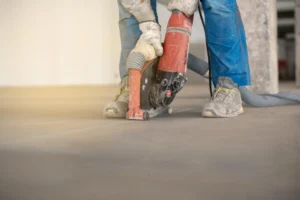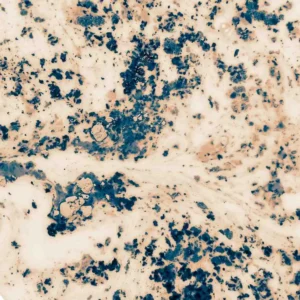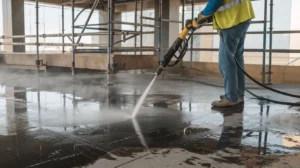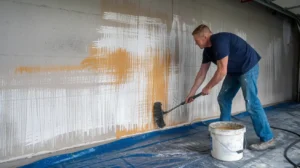When choosing the perfect material for kitchen countertops, heat resistance is often a critical factor. So, is granite heat resistant? The short answer is yes, granite is well-known for its impressive ability to withstand high temperatures.
As a natural stone formed from cooled magma, granite is inherently resistant to heat, making it one of the top choices for kitchen countertops. However, while granite’s heat resistance is widely recognized, there are essential considerations to ensure its longevity and durability.
Granite’s heat resistance is due to its formation as an igneous rock, where intense heat and pressure solidified minerals like quartz and feldspar into a robust stone. This natural composition allows granite to endure high temperatures without sustaining damage, making it suitable for various kitchen applications.
But how does granite compare to other countertop materials in terms of heat resistance? And can you confidently use granite as a cooking surface or place hot pans directly on it? This article will explore these questions and provide practical tips for protecting your granite countertops from potential heat damage.

Comparison with Other Countertop Materials
Granite’s heat resistance sets it apart from many other popular countertop materials. Let’s compare granite with some of the most common countertop materials:
Quartz
Quartz countertops, made from engineered stone, are a popular alternative to granite. While quartz is highly durable, it does not match granite in heat resistance. Quartz countertops can withstand temperatures up to around 150 degrees Fahrenheit, but exposure to excessive heat, such as placing a hot pan directly on the surface, can cause discoloration or damage. Unlike granite, quartz surfaces may contain resins and polymers that are sensitive to heat.
Marble
Marble is another natural stone often chosen for its elegant appearance. However, marble is more prone to heat damage than granite. Marble surfaces can discolor or develop heat stains when exposed to hot items. While marble can still handle some heat, it’s generally not as heat-resistant as granite.
Laminate
Laminate countertops are budget-friendly and come in various styles, but they are not heat-resistant. Placing a hot pan on a laminate countertop can cause burns, warping, or bubbling. Unlike granite, laminate countertops require protective measures, such as trivets or heat pads, to prevent heat damage.
Butcher Block
Butcher block countertops offer a warm, natural look, but they are not heat-resistant. Wood surfaces can scorch, burn, or warp when exposed to high temperatures. Unlike granite, which can withstand heat without damage, butcher block countertops need extra care to avoid heat-related issues.
Solid Surface
Solid surface countertops like Corian are non-porous and easy to maintain, but they lack the heat resistance of granite. These countertops can be damaged by hot pots and pans, leading to cracks or discoloration. Granite, on the other hand, is better suited to handle high temperatures.
Can Granite Be Used as a Cooking Surface?
Given granite’s heat resistance, many wonder if it can be used as a cooking surface. While granite slabs are incredibly durable and can withstand high temperatures, using granite directly as a cooking surface is not recommended. Granite can withstand heat from cookware, but exposing it to direct flames or intense, concentrated heat, such as that from a stovetop burner, can cause the stone to crack or weaken over time.
If you intend to cook on granite, it is better to use heat-resistant trivets or pads between the cookware and the granite surface. This practice helps distribute heat evenly and prevents potential damage to your countertop. Remember, while granite is tough, it is still a natural stone that can be affected by prolonged exposure to extreme temperatures.
Can You Put Hot Stuff On Granite?
One of the most common questions homeowners ask is, “Can you put hot stuff on granite?” The answer is generally yes, but with some precautions. Granite’s heat resistance allows you to place hot items, such as pots, pans, and baking trays, directly on the surface without causing immediate damage.
This capability makes granite an ideal choice for busy kitchens where hot cookware is often moved from the stove or oven to the countertop. However, while granite can withstand the heat, it is still advisable to use trivets or hot pads. Constantly putting hot pans on granite could cause thermal shock, leading to cracks or fissures over time.
Additionally, repeated exposure to extreme temperature fluctuations can weaken the granite’s structure. So, while granite can handle the occasional hot pan, taking preventive measures is wise to maintain its beauty and durability.

Signs of Heat Damage on Granite
Despite granite’s impressive heat resistance, it is not entirely immune to heat damage. Here are some signs to look for if your granite countertop has been exposed to excessive heat:
Discoloration
Discoloration can occur when granite is exposed to high temperatures for extended periods. The heat may cause certain minerals within the granite to oxidize, resulting in darker spots or patches on the surface. This change in color is often permanent and can affect the appearance of the countertop. To avoid discoloration, it’s essential to use trivets or heat-resistant pads when placing hot items on granite surfaces.
Cracks or Fissures
Cracks or fissures in granite can occur due to sudden temperature changes, like placing a hot pan on a cold surface. Initially, these cracks may be small and hard to notice, but they can become more prominent over time if not properly managed.
Dullness or Loss of Shine
Exposing granite countertops to excessive heat can cause them to lose their shine. The heat can break down the protective sealant, leading to a dull appearance. Without the sealant, the surface becomes more susceptible to stains. This damage can make the countertop look less polished and reduce its overall aesthetic appeal. To maintain its shine, avoid placing hot items directly on the granite.
Warping or Buckling
Warping or buckling of granite can occur when the stone is exposed to extreme temperatures, though this is rare. If the granite slab was not properly installed or supported, these temperature changes can cause the stone to deform. This issue is more likely in areas with significant temperature fluctuations. Proper installation and support are essential to prevent such problems.
Practical Tips for Protecting Granite from Heat Damage
To keep your granite countertops in pristine condition, following these practical tips for protecting them from heat damage is essential:
Use Trivets or Hot Pads
Always place trivets or hot pads under hot items on your granite countertop. This prevents direct contact between the hot cookware and the stone, protecting the surface from potential heat damage. These simple tools create a barrier that helps maintain the integrity and appearance of your granite.
Avoid Extreme Temperature Changes
Avoid exposing your granite countertop to sudden, extreme temperature changes. Placing a hot pan on a cold countertop, or the reverse, can cause damage. Always use trivets or pads to protect the surface. Gradual temperature changes are safer for the stone. This helps maintain the countertop’s durability and appearance.
Apply a High-Quality Sealant
Regularly applying a high-quality sealant to granite countertops helps protect them from heat damage by creating a barrier against heat, stains, and other issues. This protective layer enhances durability, preserving the countertop’s appearance. Follow the manufacturer’s guidelines for how often to seal for optimal protection.
Clean Up Spills Promptly
Clean spills on your granite countertop right away. Hot liquids can cause discoloration or damage if left unattended. Prompt cleaning prevents potential harm. Wipe up spills quickly to maintain the countertop’s appearance. Don’t let hot substances sit on the surface.
Avoid Direct Cooking on Granite
Avoid using granite countertops as a direct cooking surface. Always use a trivet or hot pad to protect the granite from heat damage. Direct exposure to hot cookware can cause thermal shock or damage the stone. A protective barrier helps maintain the granite’s appearance and longevity. Keep your countertops in top condition by following this simple precaution.
Common Misconceptions About Granite and Heat
Several misconceptions surround the topic of granite and heat. Let’s clear up some of the most common ones:
Granite Is Indestructible
Granite is renowned for its durability and heat resistance, but it is not completely indestructible. It can endure high temperatures and daily wear, yet excessive heat or improper maintenance can still cause harm. For instance, placing hot pots directly on granite or using harsh cleaners might lead to discoloration or damage. Regular care and appropriate use are essential to preserving its longevity.
You Can Use Granite as a Stovetop
Granite is not intended for use as a stovetop surface. Direct exposure to the high heat of cooking can damage the granite over time. While granite is heat-resistant, it is better suited for countertops rather than direct cooking applications. Regular stovetop use can lead to cracks or discoloration. To preserve granite, avoid placing hot cookware directly on it.
Granite Doesn’t Need Maintenance
Granite countertops require regular maintenance to stay in top shape. This includes periodic sealing and cleaning to protect the surface. Without proper care, granite can become more vulnerable to heat damage. Neglecting maintenance may lead to stains or other issues. Keeping up with maintenance ensures your granite looks and performs its best.
All Granite Is the Same
Not all granite is the same; variations exist in heat resistance due to different mineral compositions. Some slabs may withstand higher temperatures better than others. It’s crucial to know the specific properties of your granite countertop. Assessing these characteristics helps ensure optimal performance and durability.
Final Words
Granite countertops are a popular choice for kitchens due to their durability, natural beauty, and impressive heat resistance. While granite can withstand high temperatures and occasional hot pans, taking precautions is essential to avoid potential damage.
By understanding granite’s heat resistance, comparing it with other countertop materials, and following practical tips, you can enjoy the benefits of granite while ensuring its longevity in your home. So, is granite heat resistant? Absolutely.
However, treating your granite countertop with care will ensure it remains a stunning and functional part of your kitchen for years to come. Transform your space with our expert services contact us if you have any query or want to take our services.





